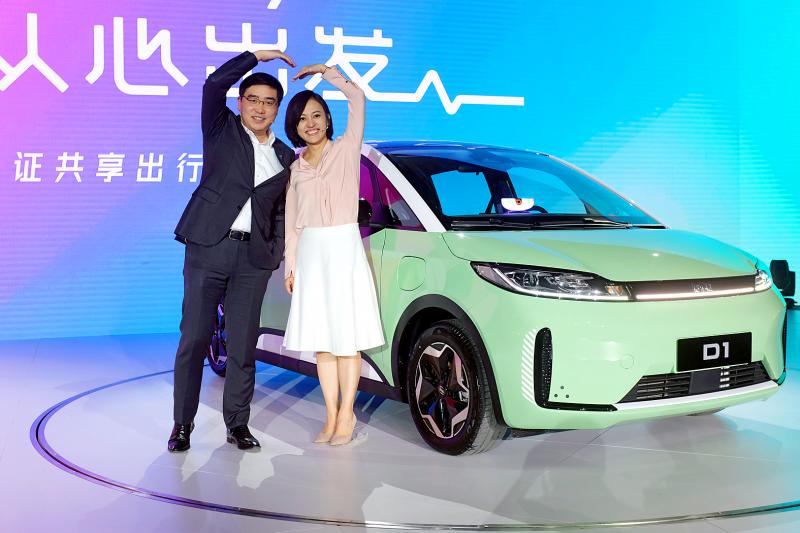Didi Chuxing (滴滴出行) is to begin rolling out an electric vehicle developed with BYD Co (比亞迪) to its drivers, aiming to reduce costs in the world’s largest ride-hailing network.
The D1, the first model to have been built with ride-hailing in mind, is to ship to the start-up’s leasing partners across several Chinese cities, Didi Chuxing said.
Made by BYD, in which Warren Buffett’s Berkshire Hathaway Inc is the largest shareholder, the vehicle has power-sliding doors and a driver assistance system.

Photo: Reuters
Didi Chuxing in 2018 flagged its intention to team up with automakers to produce customized electric vehicles for its ride-hailing service.
The firm that defeated Uber Technologies Inc in China is hoping the D1 presents a more efficient option than traditional gasoline-powered vehicles.
It already hosts about 1 million electric vehicles, which can take advantage of a growing nationwide charging network, and provides as many as 60 million rides per day.
The company, valued at US$62 billion according to CB Insights, is still recovering from a 2018 regulatory crackdown on its vehicle-pooling service and the COVID-19 pandemic that has curtailed most transportation.
Rival Internet platforms such as Meituan Dianping (美團點評) are now challenging Didi Chuxing’s leadership in ride-hailing. To compete, the company is expanding into adjacent businesses, from bike sharing to grocery delivery, to attract and keep users.
Monthly active users across Didi Chuxing’s platforms in China have surpassed 400 million, it said this month.
Longer term, it is betting on autonomous driving — a hived-off unit that received US$500 million in funding from Softbank Group Corp’s Vision Fund. Its shares trade privately at a discount of as much as 40 percent to its peak valuation, Bloomberg reported this year.

Intel Corp chief executive officer Lip-Bu Tan (陳立武) is expected to meet with Taiwanese suppliers next month in conjunction with the opening of the Computex Taipei trade show, supply chain sources said on Monday. The visit, the first for Tan to Taiwan since assuming his new post last month, would be aimed at enhancing Intel’s ties with suppliers in Taiwan as he attempts to help turn around the struggling US chipmaker, the sources said. Tan is to hold a banquet to celebrate Intel’s 40-year presence in Taiwan before Computex opens on May 20 and invite dozens of Taiwanese suppliers to exchange views

Application-specific integrated circuit designer Faraday Technology Corp (智原) yesterday said that although revenue this quarter would decline 30 percent from last quarter, it retained its full-year forecast of revenue growth of 100 percent. The company attributed the quarterly drop to a slowdown in customers’ production of chips using Faraday’s advanced packaging technology. The company is still confident about its revenue growth this year, given its strong “design-win” — or the projects it won to help customers design their chips, Faraday president Steve Wang (王國雍) told an online earnings conference. “The design-win this year is better than we expected. We believe we will win

Chizuko Kimura has become the first female sushi chef in the world to win a Michelin star, fulfilling a promise she made to her dying husband to continue his legacy. The 54-year-old Japanese chef regained the Michelin star her late husband, Shunei Kimura, won three years ago for their Sushi Shunei restaurant in Paris. For Shunei Kimura, the star was a dream come true. However, the joy was short-lived. He died from cancer just three months later in June 2022. He was 65. The following year, the restaurant in the heart of Montmartre lost its star rating. Chizuko Kimura insisted that the new star is still down

While China’s leaders use their economic and political might to fight US President Donald Trump’s trade war “to the end,” its army of social media soldiers are embarking on a more humorous campaign online. Trump’s tariff blitz has seen Washington and Beijing impose eye-watering duties on imports from the other, fanning a standoff between the economic superpowers that has sparked global recession fears and sent markets into a tailspin. Trump says his policy is a response to years of being “ripped off” by other countries and aims to bring manufacturing to the US, forcing companies to employ US workers. However, China’s online warriors